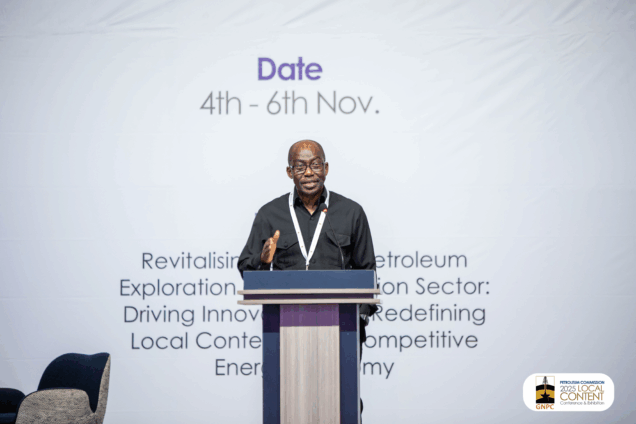
The Acting Chief Executive Officer of the Ghana National Petroleum Corporation (GNPC), Mr Kwame Ntow Amoah, has unveiled an ambitious vision to redefine local content as the cornerstone of Ghana’s energy independence and long-term operatorship.
Speaking at the opening of the 2025 Local Content Conference and Exhibition in Takoradi, Mr Amoah called for a paradigm shift in how local participation is understood and implemented within the petroleum industry. He said local content must no longer be seen as a box-ticking exercise or a procurement requirement, but rather as the core of national competence and innovation.
“Local content must evolve beyond procurement thresholds and percentage targets,” Mr Amoah declared. “It must now represent local competence, local capital and local innovation, which are the ingredients that will secure Ghana’s petroleum future.”
Mr Amoah explained that GNPC’s ongoing projects across both offshore and onshore basins form part of a deliberate strategy to position Ghana as a technically mature and self-reliant operator. He cited progress on the Voltaian Basin Project as a key milestone, saying it was bringing the country closer to its first onshore well — a development he described as a marker of Ghana’s operational independence.
“Through the plans we are charting from offshore to inland basins, control is steadily being brought back to Ghanaians,” he said. “The opportunities in both existing offshore fields and the Voltaian Basin provide new space for indigenous companies to thrive and blossom.”
As part of GNPC’s broader transformation agenda, Mr Amoah highlighted the near completion of the GNPC Research and Technology Centre, envisioned as a regional hub for applied innovation, data integration, and collaboration between industry and academia. He revealed that the corporation is deploying artificial intelligence in basin modelling and predictive maintenance, helping to enhance exploration efficiency and improve knowledge transfer across the upstream sector.
“We are investing in technology, research and people,” he stated. “GNPC is nurturing innovation that will make it a leader, not just a participant, in the global oil and gas landscape.”
The GNPC boss also reaffirmed the corporation’s collaboration with the Association of Ghanaian Suppliers to deepen vendor participation and strengthen local enterprises across the petroleum value chain. He said GNPC’s goal is to create “a value chain that delivers real value to the people of Ghana,” explaining that revitalising the sector requires inclusive partnerships between government, investors, and operators.
Mr Amoah urged all industry stakeholders to align on a shared vision that promotes collaboration rather than competition in capacity building, technology transfer, and knowledge sharing. “Revitalising the exploration and production sector is both an industry imperative and a national responsibility,” he added.
As the conference continues with discussions on innovation, gas monetisation, and financing models, GNPC’s evolving role as both a national partner and operator is expected to remain central to shaping Ghana’s future energy strategy.
